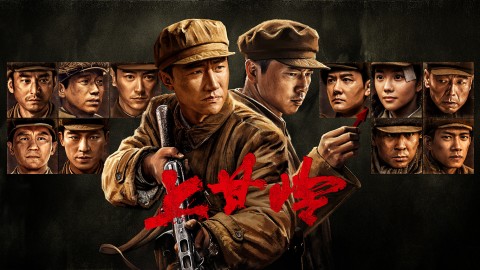Episode 5 recap: Sealed Regret.
After returning home that day, Luo Yu Tong applied medicine to Luo Xiaoman's injuries. Luo Xiaoman claimed not to feel any pain and asked her mother not to cry. Luo Yu Tong thought that Luo Hai had always been useless. Even when their family was mistreated, he only asked them to endure. This time, Luo Hai didn't need to intervene. She would handle it herself.
Wang Suhua's grandson, due to his father's domestic violence, developed a tendency for violence and deliberately attacked Luo Xiaoman. Wang Suhua consistently favored her grandson. Luo Yu Tong arranged a meeting with her and asked what she wanted. Luo Yu Tong took a knife and fatally stabbed Wang Suhua. However, she was extremely frightened by her first murder and hastily covered it up before fleeing.
Luo Hai noticed that something was wrong and was shocked as well, but he could only help Luo Yu Tong clean up the mess. As he had said, he placed Wang Suhua's body in a suitcase and used a trolley to dispose of it in an unfinished building. Because Feng Ying always sided with Wang Suhua's grandson, Luo Yu Tong also decided to kill her. She arranged a meeting with Feng Ying in a small grove and killed her. Unfortunately, Zhang Liang happened to discover them on that day and used it as a threat against Luo Yu Tong.
Now there is solid evidence, and Luo Yu Tong has been brought back and admitted to her crimes. She believes that her father is a coward who doesn't care when his own child is mistreated. Luo Yu Tong refused to be like him. Regarding Liang Dong Ni's situation, she told Luo Yu Tong about being raped by Li Jian. Li Jian had a senile elderly person at home, and if he died, there would be no one to take care of that person. That's why Luo Hai didn't kill him.
Luo Yu Tong questioned why they didn't report to the police. Liang Dong Ni believed that Luo Hai was in the wrong for not doing so but thought it was to protect Luo Yu Tong's reputation. However, Luo Yu Tong didn't believe it and thought that Luo Hai was merely concerned about his own reputation.
Xiao Yi informed Luo Yu Tong about Luo Hai covering up the crimes and taking all the blame upon himself. Cutting off Feng Ying's hands was because she had scratched Luo Yu Tong. Luo Yu Tong wondered if Luo Hai didn't suffer while committing these acts.
Luo Yu Tong was shocked by this revelation and asked Xiao Yi if she could see Luo Hai one more time.
Luo Yu Tong is about to be taken away. In the hallway, she sees Luo Hai and kneels down to kowtow to him three times. Now that this case is considered closed, Luo Yu Tong and the others need to pay the price for their actions, and Li Jian has been sentenced for rape.
Xiao Yi and the others discuss this matter, and Liang Dong Ni doesn't know what should be done about Luo Xiaoman. Xiao Yi mentions that the welfare institution has mentioned that there is a high chance of her being adopted given her current age. Dou Zi Lin feels frustrated because of her own mistakes, and Xiao Yi comes out to comfort Dou Zi Lin.
A colleague approaches Xiao Yi and informs him that someone from the police station is looking for him, claiming to be his sister. Xing Man has been brought in for a fight, and Xiao Yi completes the procedures to take Xing Man out. Xiao Yi feels that after two years, Xing Man still only knows how to get into fights. Xing Man clarifies that she didn't ask Xiao Yi for help; she just wanted him to bring her ID card.
Xiao Yi and Xing Man return together. Xiao Yi's master is now confused and believes that his wife is still alive, so he puts food in her bowl. Xing Man asks if he took his medication today, and he says he did but remains in this state. The master brings up Xiao Yi's deceased girlfriend, Xiao Wen, and advises him not to focus only on work. Xiao Yi feels saddened by his words.
Xiao Yi arrives at the antique shop again, and the owner expresses not knowing what kind of watch Xiao Yi is looking for. The owner mentions that they will soon return to their hometown and close the shop. Xing Man is distributing flyers on the street when Bai Zhe approaches her with a gun. Xing Man realizes that the gun is fake.



What qualifications do these two police officers have to shout and yell at the former victims? They didn't grow up in the other person's environment, so they have no right to judge them based on their own moral standards.
You may have the right to determine her guilt, but you have no right to yell at her using normal moral standards. It's like kindergarten teachers and a mute elderly woman defending a boy with violent tendencies due to domestic violence.
His tendency to bully classmates can be understood because of the abuse he experienced at home. But Luo, with his psychologically twisted nature shaped by his upbringing and with the criminal capacity of an adult, suddenly becomes the target of shouting and condemnation.
Luo's father suddenly becomes the epitome of a good person. This logic is quite amusing.
But I believe that the perpetrators should not use their own pitiful circumstances as an excuse to harm others. I can understand it, but I can't agree with it. You can't expect others to agree either, because according to this logic, just because I am a healthy person and a kind and empathetic person, I should forgive.
This cannot be considered a valid reason for being harmed. And then the victims start to think that it's their own fault, that they deserve to be harmed. Why should I understand those who hurt me?
Just because they are pitiful, does that give them the right to harm others?
It's not very logical. How could Luo Yutong, who comes from a timid and weak family background, kill that old man right from the start? If the first victim was portrayed as a crime of passion or a mistake, it would be more in line with the progression of her mindset as a murderer.
Moreover, it's easier for a murderer to seek revenge on a child than on an adult, so why didn't she target that boy instead and instead chose to target the old man and young women?
Please note that the provided is based on the rules you specified, and certain nuances or cultural references may be lost in .
If he had sought revenge on the man who assaulted his daughter from the beginning, even if it meant stabbing him a few times without killing him, it would have been better.
Showing kindness to a rapist is showing kindness to the one who raped his own daughter, and that is the greatest harm to his own daughter. It's only natural to harbor resentment.
Even if he had just reported it to the police, his daughter wouldn't have become extreme to the point of taking someone's life.
So it's all a chain reaction, sowing what you reap: starting from the moment Yutong was sexually assaulted, her father's obsession with maintaining face and his weakness, his inaction and failure to protect his child, which instead pitied the perpetrator.
Then, Yutong's disappointment led her to run away from home and give birth to Xiaoman. From there, Xiaoman became a victim of school violence, with teachers and the bully's parents failing to take action and instead siding with the bully.
Yutong, due to the lack of a sense of safety and protection from her parents since childhood, with parents failing to properly educate and guide her, was left to solve problems on her own at a young age, without adult support or guidance.
This gradually twisted her mind and turned her from a victim into a perpetrator. Therefore, everyone needs to reflect on their own methods of education and their conceptual issues. It's already 2023, and the notion that victims are to blame still persists.
It takes two to tango, but when a family member is harmed, the immediate response is not to address the problem or hold the person responsible for hurting their family accountable, but to feel humiliated and let the victim swallow their grievances, not standing up for their family, and blaming the victim instead: "Why didn't you protect yourself?
Even bad people deserve sympathy. If bad people can change, are they still bad people? If you tell wolves not to eat livestock, are they still wolves?" It is ironic that those who superficially appear to be reasonable and neutral, but actually protect the perpetrators, are the ones accusing the victims, causing them further psychological harm.
This leads many people to extreme measures because they realize that as victims, not only do they not receive protection, but they also face blame. What's laughable is that when you pick up a knife to fight back, those who were previously reasonable suddenly become the good guys: "Even if the bad person made a mistake, you can't do that." "Even if the bad person committed a crime, you can't do this.